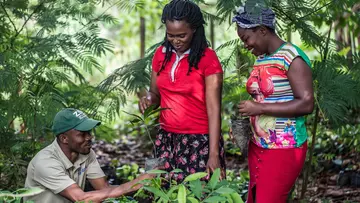
The Douala-Edéa landscape has the largest and most intact estuarine, freshwater, and coastal forest complexes in Africa. It harbours a wealth of biodiversity, including several threatened species and provides vital ecosystem services which local communities rely on.
Challenges in the Doula-Edéa landscape
Almost 25% of the total population living in this coastal ecosystem carry out subsistence and small-scale agriculture on the land surrounding the lake and over 15% of households are dependent on fisheries. Communities face poverty, unpredictable incomes, lack of food caused by seasonal changes and a decline in the fisheries they depend on caused by unsustainable fishing practices.
The demand for wood (for fuelwood, construction and use in bivalve and smoked fish industries) results in the overharvesting of mangroves and the loss of important nursery sites for fish. Threatened species such as turtles, forest elephants, manatees and crocodiles, experience habitat loss and encroachment and poaching.
People thrive where nature thrives
We're working collaboratively with local communities to improve co-existence with wildlife, safeguarding nature and creating a healthier, sustainable future for both wildlife and people.
The BIOPAMA Programme in Doula-Edéa
To address these threats and secure the future of the ecosystem, we started a project with the support of the European Union and the Organisation of African, Caribbean and Pacific States through the BIOPAMA Programme in 2020.
Working with public agencies
With our partner Cameroon Wildlife Conservation Society (CWCS), we’ve been increasing coordination among public agencies and assessing current management. This is to generate recommendations for the creation of a management plan.
Installing signs
We will also be installing 26 signs at key sites around the park, detailing location of boundaries and prohibitions and best practices operating within the Park, to increase awareness within the local community as well as visitors.
Carrying out camera trap surveys
To support the conservation of threatened species, we're performing camera trap surveys for terrestrial species and surveys of sea turtles, to gather essential biodiversity assessment data which will inform the management plan for these species and the habitat.
Initial results have recorded the first ever photographic evidence of chimpanzees and forest elephants in the Park.
Before this, the team had only recorded indirect evidence of these species (such as track marks or dung samples). Future camera trap deployments will confirm the number of individuals living in the park as well as their health.
Training law enforcement
We've also started to train the Ministry of Forestry and Wildlife (MINFOF), Ministry of Livestock, Fisheries and Animal Industrie (MINEPIA) and Gendarmerie in law enforcement, SMART data collection, adaptive management, and promotion of sustainable fishing practices. This will increase the capacity of these agencies and their collaboration for park management.
And it will be supported by the design of a best practice patrolling plan for the two Protected Areas and the establishment of a management committee for Douala-Edéa National Park.

Setting up Village Savings and Loan Associations
We engage local communities with the creation of Village Saving and Loan Associations (VSLAs).
This is being supported with the development of sustainable income generating activities.
The VSLA groups have chosen to start snail farming, and farming of watermelon and cucumber, which will reduce reliance on unsustainable fishing practices and provide a sustainable source of income, reducing overall poverty.
VSLAs will also act as a platform to discuss environmental topics with communities and conservation messaging. This results in community members taking ownership of preserving this vital ecosystem.
People involved
Nelson Fawoh – Douala-Edéa Project Coordinator
Andrew Fowler – ZSL West and Central Africa Regional Manager
Partners and sponsors
With thanks to the support of the European Union and the Organisation of African, Caribbean and Pacific States through the BIOPAMA Programme.
We work in partnership with
Cameroon Wildlife Conservation Society (CWCS)
African Marine Mammals Conservation Organisation
Ministère des Forêts et de la Faune de la République du Cameroun (MINFOF)
MINEPIA
Urgent action to stop the devastation of critical species and habitats by helping people and wildlife live better together, is the only way to save the natural world we love and depend upon. That’s where ZSL comes in, and where you can play your part.
